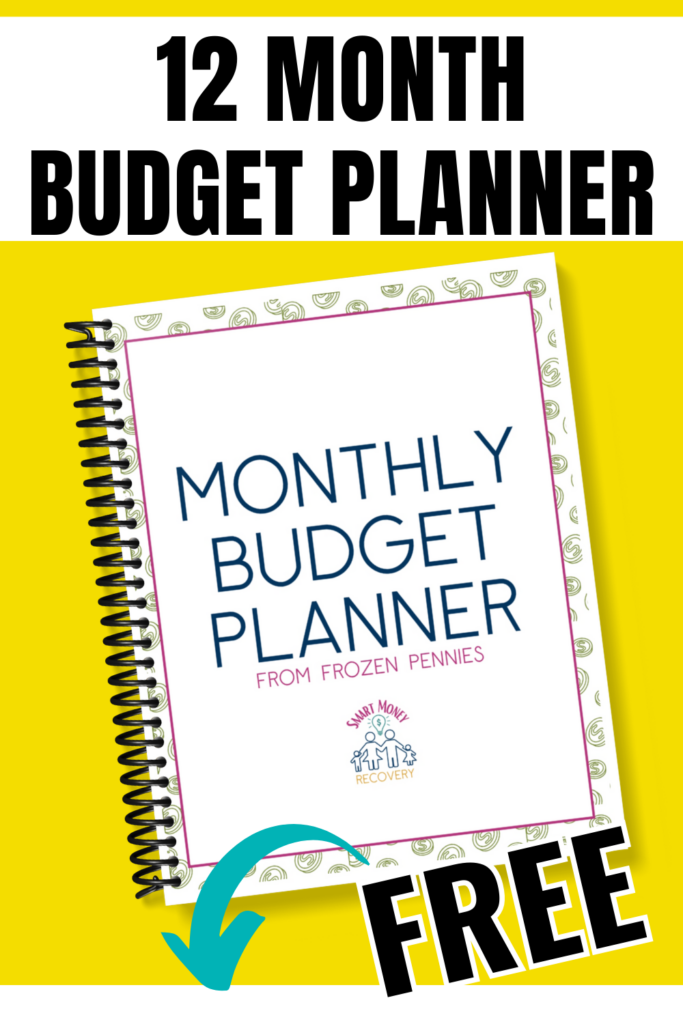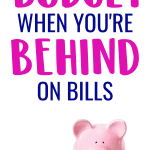Many of us have been there. For one reason or another, we fall behind on the bills. We run into an unexpected financial disaster, or we get lazy and stop following the budget or anything else. Here is a way to take control of your finances when you have fallen behind.

Step One.
Stop spending money. Seriously. Your current financial situation is in crisis mode as of this minute, so all spending is frozen. Let me repeat for a dramatic effect. STOP. SPENDING. MONEY.
Step Two.
If you can still get a paper check, cash it and bring it home. Working with your cash makes getting out of a hole much more manageable. If this isn’t possible, we will address this in a moment.
The four most important monthly bills to be paid are:
- Shelter
- Electric and heat (utility bills)
- Transportation
- Food
Other monthly expenses like credit cards and fun stuff like cable can wait. If they turn off your internet, they turn off your internet. Life happens. Pay your rent or mortgage first, then electric and heat if those are different and the season is cold. Take care of car insurance, monthly payments, and gas next.
Step Three.
Last is the food. However, this needs a closer look. Let’s practice a little tough love with the groceries for a bit. Take note of what you already have. Go through your cupboards, pantry, refrigerator, and freezer, and write down everything you have. It’s time to get creative and develop some recipes for all that stuff you haven’t eaten yet.
Shop the bare bones of what you need. This is not the time to worry about organics or fancy meals. This is about getting as many nutrients into your body for as little cost as possible.
I have a grocery ebook filled with great ideas for groceries on a small budget. Please consider subscribing for your free copy!
Grab $20 and pick up some essentials that can be added to what you already have. Remember, shop frugally.

Step Four.
If your bank account is in the negative, you will have to get that cleared up first. If your mortgage payments are taken out automatically, let that happen.
Pay for the necessities listed above first. I suggest doing Anything you can pay with cash or money order. The stress of it getting returned or declined is gone. You need to decrease as much stress as you can right now.
Take out that cash after all the automatic withdrawals have been accounted for. Cash is tangible. You can see, feel, smell, and manage it. When you spend $20 on groceries, you watch that $20 bill leave your hands, knowing it has been accounted for.
Step Five.
Pay on what is on top of your list. Is it the phone bill, credit cards, the loan from your Grammie, or the cable/internet (seriously consider canceling cable right now).
If you have nothing left, go through your home and find things you no longer use. List them and sell them. Facebook Marketplace is excellent for this, as well as Craigslist. They do not charge, and you do not have to pay to ship. Sell everything that you don’t need or use anymore.
Each pay period, follow the same steps until you feel caught up. If you can’t catch up after several attempts, consider cutting some stuff out of your life (cut cable, sell the car) or finding a way to bring in extra money with a second job, side hustle, or part-time work (clean houses, babysit, elder care).
Because you are in survival mode, no unnecessary spending should occur. Any kind of fun with a charge has to stop for a while! Everyone will live. It’s temporary.
Step Six.
Don’t let it happen again. Setting up a budget, having a small emergency fund, and preparing for other expenses with sinking funds is a good idea. Prepare yourself. Live your life, and don’t let it happen to you. Control where your money goes and be ready.
How to Avoid Getting Behind on Bills in the Future
To stay caught up on your bills in the future, consider the following strategies.
- Establish an Emergency Fund: Start by building an emergency fund that can cover 3-6 months of living expenses. This safety net will be invaluable during unexpected financial crises, such as job loss, a major health issue, or unexpected expenses like a vehicle breakdown.
- Track Your Spending: Keep a close eye on your cash flow. Understand where your money goes each month. Use a monthly budget app or tools that can help you track your income and expenses.
- Pay Bills On Time: Automate your bill payments to avoid late fees. This ensures your bills are paid on their due date, which helps you avoid unnecessary charges.
- Cut Back on Non-Essential Expenses: Review your monthly spending habits and identify areas where you can cut back. This could be anything from eating out less to making sure you’re not paying for subscriptions you no longer use.
- Increase Your Monthly Income: If you’re struggling to meet your expenses, look for ways to bring in extra income. This could mean taking on a part-time job, freelancing, or selling items you no longer need.
- Save for Large Purchases: Avoid impulse buying and instead plan savings goals for more significant expenses. This will help you avoid debt and keep your budget on track.
With these strategies in place, you’ll be better equipped to manage your personal finances for the long run effectively and prevent falling behind on your bills.

Bonus Tips To Help Live on a Budget
Negotiate with Creditors
If you struggle to meet your debt payments, don’t hesitate to negotiate with your creditors or service providers. Companies are often willing to help consumers who are proactive about managing their debt. You could negotiate lower interest rates, extend your payment schedule, or even reduce the total amount you owe. The key is communicating with creditors that you need help when you suspect you might have trouble with your payments. Explain your situation clearly and honestly, and ask about any hardship plans they might offer.
Consolidate Your Debts
A balance transfer credit card can be a practical tool for managing high interest rates credit card debt. These cards typically offer a low introductory interest rate, which can help you save money on interest payments while you pay down your debt.
However, be mindful of the terms. Ensure you understand the length of the introductory period and the interest rate once it ends. Also, remember that fees may be associated with transferring a balance. Always read the terms and conditions carefully before proceeding with a balance transfer.
Celebrate Small Victories
During your journey to financial stability, it’s essential to celebrate small victories along the way. Each time you pay off a debt, no matter how small, or reach a savings goal, take a moment to recognize your accomplishment.
This doesn’t necessarily mean splurging or spending too much money; instead, it might be taking a moment to take a deep breath and reflect on your success, sharing your achievement with a supportive friend or family member, or treating yourself to a simple and affordable pleasure, like a walk in the park or a homemade treat. The good news is these celebrations help reinforce positive behaviors and motivate you on your path to financial health.
Final Thoughts on How to Budget When You Are Behind on Your Bills
Having overdue bills is a challenging situation that many of us may face at some point in our lives. However, it’s important to remember that it’s not an insurmountable obstacle. You can regain control over your financial situation with careful planning, disciplined budgeting, and a financial plan with proactive steps.
It’s crucial to take an organized, systematic approach, cutting back on non-essentials, tracking your spending, and exploring other sources of income. You can manage your debts more effectively by employing strategies like negotiating with creditors and consolidating debts.
Remember, every small step towards financial health is a victory in its own right. Keep sight of your progress, and remain patient and committed to your journey towards financial stability.


 10 Qualities Of A Homemaker You Must Know
10 Qualities Of A Homemaker You Must Know
Maku Oluwaseun
Budgeting when you are behind on your bills can be a tough thing to do but you have made it easier on people who need this. Thanks a lot.